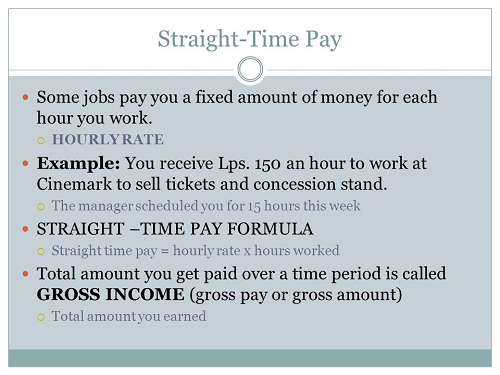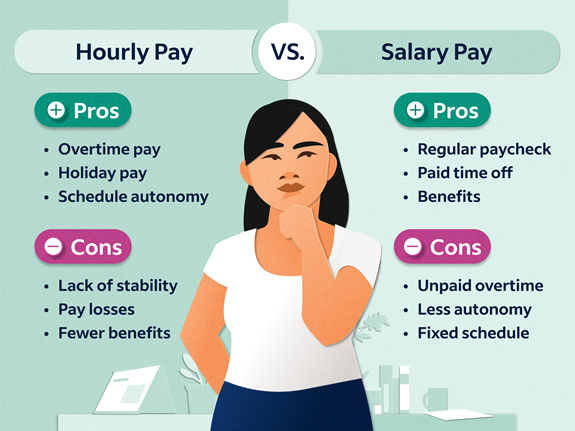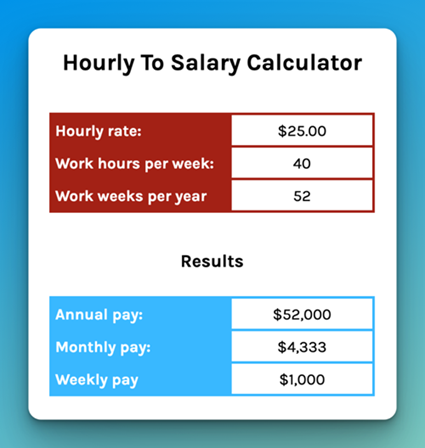Section 1-1: Hourly Pay
Section 1-1: Hourly Pay
Overview

 Calculating straight time pay involves determining the compensation an employee earns for their standard hours worked during a given pay period. This computation typically entails multiplying the regular hourly wage by the number of hours worked, excluding any overtime rates or premiums.
Calculating straight time pay involves determining the compensation an employee earns for their standard hours worked during a given pay period. This computation typically entails multiplying the regular hourly wage by the number of hours worked, excluding any overtime rates or premiums.
The formula for calculating straight time pay is as follows:
Straight Time Pay = Regular Hourly Rate × Number of Hours Worked
In essence, this calculation provides the baseline pay for an employee's standard working hours before factoring in any additional compensation for overtime or other premium pay rates. Straight time pay is a fundamental aspect of wage computation, particularly in industries where standard working hours are prevalent and overtime pay policies are in place.
'Hourly pay' and 'straight time pay' are related concepts, but they represent different aspects of compensation for employees.
Hourly Pay: Hourly pay refers to the compensation an employee receives for each hour worked. This pay structure is common for jobs where the number of hours worked can vary from week to week, and employees are paid based on the number of hours they work. Hourly pay rates are typically agreed upon between the employer and the employee and are often outlined in an employment contract or determined by industry standards.
Straight Time Pay: Straight time pay, on the other hand, refers specifically to the compensation an employee earns for their regular hours worked at their standard hourly wage rate. It excludes any additional compensation for overtime hours or other premium pay rates. Straight time pay is the base pay an employee receives for their standard working hours before any overtime or other adjustments are applied.
In summary, hourly pay is the rate at which an employee is compensated per hour worked, while straight time pay represents the compensation earned for standard hours worked at the regular hourly rate, excluding any overtime or premium pay.
Online Textbook Read Section 1-1: (Calculate Straight Time Pay)
What is Hourly Pay?
Overview

 A salary is a fixed regular payment or compensation that an employee receives from an employer in exchange for their work or services. Unlike hourly pay, which is based on the number of hours worked, a salary is typically expressed as an annual or monthly amount regardless of the number of hours worked.
A salary is a fixed regular payment or compensation that an employee receives from an employer in exchange for their work or services. Unlike hourly pay, which is based on the number of hours worked, a salary is typically expressed as an annual or monthly amount regardless of the number of hours worked.
Key points about salaries include:
Fixed Amount: A salary is a predetermined amount that an employee receives on a regular basis, usually weekly, bi-weekly, monthly, or annually. This amount remains consistent regardless of fluctuations in the number of hours worked, unless there are specific arrangements for overtime pay or bonuses.
Annual or Monthly Basis: Salaries are often quoted on an annual or monthly basis. For example, an employee might be offered an annual salary of $50,000, which would be paid out in equal installments over the course of the year.
Exempt vs. Non-exempt Status: In many jurisdictions, employees are classified as either exempt or non-exempt from overtime pay regulations based on their job duties and salary level. Exempt employees are typically paid a salary and are not entitled to overtime pay, while non-exempt employees are typically paid hourly wages and are entitled to overtime pay for hours worked beyond a certain threshold.
Benefits and Perks: Salary-based positions often come with additional benefits and perks, such as health insurance, retirement contributions, paid time off, and bonuses. These benefits can vary depending on the employer and the terms of employment.
Negotiable: Salary amounts are often negotiable during the hiring process or during performance reviews. Employees may negotiate their salary based on factors such as their experience, qualifications, industry standards, and the specific responsibilities of the position.
Overall, a salary provides stability and predictability for both employers and employees, as it guarantees a fixed income over a specified period of time, regardless of variations in workload or hours worked.
Hourly pay refers to the compensation an employee receives for each hour they work. It's a common method of payment for jobs where the number of hours worked can vary from week to week.
 For example, if someone earns $15 per hour and works 40 hours in a week, their total pay for that week would be $600 ($15 x 40 hours).
For example, if someone earns $15 per hour and works 40 hours in a week, their total pay for that week would be $600 ($15 x 40 hours).
Hourly pay rates can vary widely depending on factors such as the type of work, level of skill or experience required, geographic location, and industry standards.
Hourly pay is often used for part-time, temporary, or hourly-wage positions, but it can also be used for full-time positions in industries where hours may fluctuate, such as retail or hospitality.
Employers typically calculate hourly pay by multiplying the hourly rate by the number of hours worked, and employees may receive overtime pay for hours worked beyond a certain threshold (usually 40 hours per week), typically at a rate of 1.5 times their regular hourly rate.
Understanding hourly pay is important for both employees and employers to ensure fair compensation for work performed and compliance with labor laws and regulations.
Objective: Understand how to calculate hourly pay.
Definition: Hourly pay is the amount of money you earn for each hour you work. It's commonly used for jobs where the number of hours worked can vary from week to week.
Formula: Hourly Pay = Total Pay / Number of Hours Worked
Example: Let's say you worked at a job and earned $500 for the week. During that week, you worked 40 hours.
Step 1: Write down the given values:
- Total Pay = $500
- Number of Hours Worked = 40 hours
Step 2: Plug the values into the formula:
- Hourly Pay = $500 / 40 hours
Step 3: Calculate:
- Hourly Pay = $12.50 per hour
Conclusion: Your hourly pay rate for that week is $12.50 per hour.
Additional Considerations:
- Taxes: Remember that the actual amount you take home may be less due to taxes and other deductions.
- Overtime: If you work more than a certain number of hours (usually 40 hours in a week), you may be entitled to overtime pay, which is typically 1.5 times your regular hourly rate.
- Benefits: Some jobs offer additional benefits such as health insurance, retirement plans, or paid time off, which can affect your overall compensation package.
Understanding how to calculate hourly pay is essential for managing your finances and understanding your earnings for the work you do. It allows you to compare job offers, track your income, and budget effectively.
Videos (Click on Image to View Videos)
